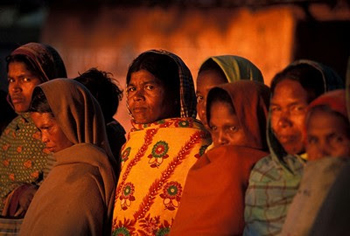Maharashtra state gets new law against social boycott, church asks other states to adopt
Mangalore Today News Network
Aug 01, 2017: The western Indian state of Maharashtra has made social exclusion on the basis of caste, religion or race a criminal offence warranting a church official asking other states to emulate this example to help poor people who face rejection because of their faith.
 The Prohibition of People from Social Boycott (Prevention, Prohibition, and Redressal) Act 2016, got the approval of Indian president Pranab Mukherjee July 20, making it a full-fledged law. The Indian term "social boycott" includes preventing certain people because of caste, religion, culture from participating in religious programmes, festivals, or even from using common institutions like schools and hospitals.
The Prohibition of People from Social Boycott (Prevention, Prohibition, and Redressal) Act 2016, got the approval of Indian president Pranab Mukherjee July 20, making it a full-fledged law. The Indian term "social boycott" includes preventing certain people because of caste, religion, culture from participating in religious programmes, festivals, or even from using common institutions like schools and hospitals.
The new law, a first such in the country, prohibits social boycotts in the name of caste, community, religion, rituals or customs. Violators, who impose or abet a social boycott, will be punished with years in jail and a fine of up to 100,000 rupees (about US$1,500), the law states.
"Dalits across India are bound by the village-level caste system without access to legal mechanisms to solve conflicts," said Rev Z. Devasagayaraj, secretary of the Indian bishops’ office of backward and indigenous classes. He said other states should follow suit and enact similar legislation.
Many parts of India are notorious for targeting people who question caste domination or those in inter-caste marriage, making social boycotts a grave concern, the priest said.
Indian media frequently report how in the villages poor Dalit and tribal people who become Christians face social boycotts engineered by Hindu groups who work to make India a Hindu nation.
Social boycotts, include cutting off access to common facilities in a village like water sources, transport and not employing those targeted. The tactic makes their lives miserable, often resulting in them being forced to quit their village.
Advocates of Dalit and minority rights such Rev Devasagayaraj considers the legislation "historic" and that it has the potential to ensure social equality for the country’s discriminated groups.
The Sanskrit term Dalit means "trampled upon" and denotes the former untouchable castes within Indian society that is made up of a four-tier caste system. They are often the target of disempowerment, oppression and persecution despite the Indian constitution abolishing caste discrimination and laws making "untouchability" a punishable offence.
Dalits have suffered centuries of social exclusion and discrimination from upper-caste people who considered themselves superior. The upper-castes thought that merely touching a Dalit person, always engaged in menial and despised jobs, would pollute them.
- Karnataka gang rape: H K Patil says govt seriously considering ways to boost security for tourists
- Puttur: Woman loses Rs 4.90 lakhs in online investment fraud
- Mangaluru: Right-Wing activists intercept illegal beef transport near Kadri temple
- Speaker Khader asks cops to form special team to trace missing Nitesh
- Bantwal: Fire destroys coconut oil mill at Bambila
- Udupi: Cyclist dies in road mishap
- Bengaluru, 11 other districts likely to get year’s first pre-monsoon showers this week
- Karnataka forest minister orders ban on sale of shampoo, soaps near rivers, lakes
- Mangaluru Hosts Karnataka State Police Run-2025
- Protest Against Wakf Amendment Bill Held in Mangaluru
- Missing Student Ran Away Over Exam Fear: Superintendent of Police
- Kasaragod: Missing Schoolgirl and Driver Found Dead in Merkala Forest After 26 Days
- The Intriguing Story Behind Diganth’s Mysterious Disappearance!
- Lok Sabha proceedings disrupted as DMK members protest over Dharmendra Pradhan’s remarks
- Ban direct and indirect ads related to tobacco, alcohol: Health Ministry to IPL
- 391 kg meth, 109 kg cocaine: FBI in pursuit, drug kingpin arrested in India
- Gold smuggling accused Ranya Rao allotted land to set up steel plant during previous regime: KIADB
- Hats off to Rohit Sharma: Shama Mohamed’s huge praise days after fat-shaming him
- India clinch thriller vs New Zealand to win record 3rd Champions Trophy
- Vanuatu PM orders cancellation of Lalit Modi’s passport for attempt to evade extradition
- One killed, 70 injured as bus topples in Chamarajanagar
- Devotees Flock to Prayagraj’s Sangam Even After Maha Kumbh Ends
- India Condemns Vandalism at Hindu Temple in California, Calls for Strict Action
- Delhi CM Rekha Gupta-led cabinet approves ₹2,500 monthly aid for women
- After Ranya Rao’s arrest, CBI to probe international gold smuggling ring
- Court remands Maoist Lakshmi to six-day police custody
- Sandhya Shenoy honored with Society for Materials Chemistry Medal-2024
- White Cornus Apartment in Mangaluru
- City girl wins first place in state-level spell bee competition
- Alleged ‘Love Jihad’ Case in Mangaluru: Woman left home voluntarily, says police
- Girl fatally struck by reckless two-wheeler near Belman
- New residential complex for the judges inaugurated in Mangaluru
- Absconding accused nabbed after 8 years
- Truck with cylinders turns turtle in Beltangady
- Bhoota Kola artist dies of cardiac arrest
- Development of the country should be our goal: Ganesh Karnik
- Container truck gets stuck under Modankap railway bridge
- Truck crushes bike’s pillion rider near BC Road
- Head constable dies of heart attack
- Udupi: PDO dismissed over financial irregularities
- CITY INFORMATION
- TRAVEL
- TOURIST INFORMATION
- HEALTH CARE
- MISCELLANEOUS




 Write Comment
Write Comment E-Mail To a Friend
E-Mail To a Friend Facebook
Facebook Twitter
Twitter  Print
Print 



